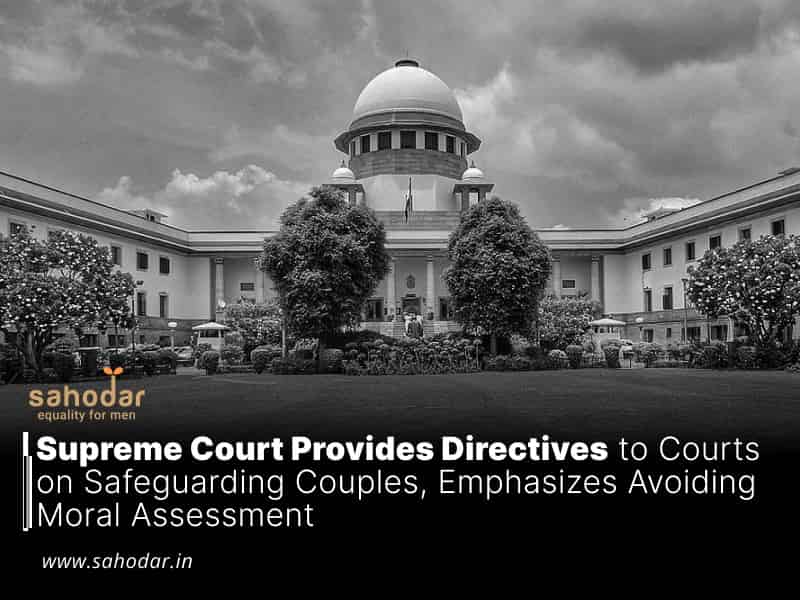Significantly, the Court said that same-sex, transgender, interfaith or inter-caste couples must be provided immediate protection before they are asked to establish the threats they face.
The Supreme Court of India has recently issued a comprehensive set of guidelines for courts to adhere to when handling petitions filed by couples seeking protection. In a case involving Devu G Nair versus The State of Kerala & Others, the court emphasized the importance of avoiding intrusive inquiries into the nature of the couples’ relationships.
Presided over by Chief Justice of India (CJI) DY Chandrachud, Justice JB Pardiwala, and Justice Manoj Misra, the bench underscored the mandatory nature of these guidelines, stressing that they must be followed diligently to safeguard the fundamental rights and dignity of intimate partners, including those belonging to the LGBTQ+ community.
Furthermore, the apex court cautioned against the tendency of courts to pass moral judgments on such couples, highlighting the need for impartiality in adjudication.
“Social morality laden with homophobic or transphobic views or any personal predilection of the judge or sympathy for the natal family must be eschewed. The court must ensure that the law is followed in ascertaining the free will of the detained or missing person,” the top court said.
The Court emphasized the urgent need to offer immediate protection to same-sex, transgender, interfaith, or inter-caste couples without requiring them to first prove the threats they face.
Additionally, the Court stressed that dismissing a habeas corpus petition solely based on the age of a party is unacceptable.
In a significant cautionary note, the Court warned High Courts against attempting to alter an individual’s identity or sexual orientation through what it deemed as merely “counselling.”
This issue came to the fore in a Habeas Corpus petition concerning the alleged illegal detention of a lesbian partner by her parents. It was brought to the attention of the Supreme Court that the Kerala High Court often mandated counselling in cases involving same-sex couples.
Recognizing that directives for counselling or parental intervention could deter members of the LGBTQ+ community, the Court underscored the necessity of establishing clear guidelines for courts handling habeas corpus petitions and those seeking protection from familial or police interference.
“The importance of a chosen family is sometimes lost to the traditional assumption that the natal family is respectful of a person’s choices and freedoms. Courts must not wittingly or unwittingly become allies in this misunderstanding, more so in cases involving habeas corpus petition, petitions for protection of the person, or in missing persons’ complaints,” the top court remarked.
Accordingly, the Supreme Court has laid down the following directives:
- Habeas corpus petitions and petitions for protection filed by a partner, friend, or family member must be prioritized in scheduling and hearing before the court. The court should avoid unnecessary adjournments or delays in resolving the cases.
- The court should not delve into the specific nature of the relationship between the petitioner and the individual while assessing their legal standing.
- Efforts should be made to create a conducive environment for open and voluntary dialogue to ascertain the wishes of the person in question.
- The court must ensure the privacy and safety of the detained or missing person by conducting in-camera proceedings and allowing them to interact with the judges in chambers. Any recordings must be securely stored to prevent unauthorized access.
- It’s imperative that the detained person’s wishes are not unduly influenced by the court, police, or family members. Measures should be taken to prevent the presence of individuals allegedly detaining the person against their will during court proceedings.
- When meeting with the detained person, the court should prioritize their comfort and well-being, respecting their preferred name and pronouns, providing amenities like water and restroom access, and allowing breaks as needed. Judges should adopt a friendly and compassionate approach to ease any tension.
- While the court may ascertain the age of the detained person, minority status should not be used to dismiss a habeas corpus petition against illegal detention by family members.
- Judges should demonstrate empathy and avoid personal biases or prejudices, ensuring adherence to the law while respecting the detained person’s autonomy.
- If the detained person expresses a desire not to return to their alleged detainer or family, they should be released immediately without delay.
- Recognizing the social stigma faced by some intimate partners, particularly those in same-sex, transgender, interfaith, or inter-caste relationships, the court should grant interim police protection before establishing the threshold requirement of grave risk of violence.
- The court should refrain from issuing directives for counseling or parental care, focusing instead on ascertaining the detained person’s will.
- Judges must refrain from attempting to influence the admission of sexual orientation or gender identity and swiftly address any discriminatory behavior or remarks during proceedings.
- Sexual orientation and gender identity are private matters of self-identification, and the court should avoid passing judgment or making derogatory comments in cases involving LGBTQ+ individuals.

